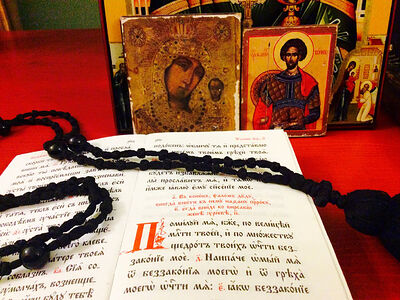Part 1/1: Let us Fast in Earnest
Part 1/2: The Meaning and Significance of Fasting
Part 1/3: Accustoming Ourselves to Fasting
Part 1/4: Spiritual Fasting
Prayer is the conversation between a Christian’s nous and heart and God, addressed to Him in order to glorify His holy name, or to offer Him thanks, or to entreat of Him everything we need for spiritual and bodily life. Therefore, there are three kinds of prayer: doxology, thanksgiving, and supplication.
The work of prayer is the very first, the most important in the life of a Christian. Prayer is the breath and life of our spirit, such that if we have prayer, then our spirit is alive; and if we have not prayer, then neither is there life in the spirit.
Prayer is very beneficial for the soul, for the body, and for the external well-being of a Christian: Bringing the soul nearer to God, prayer enlightens it, heals its infirmities, and fills it with spiritual joy; prayer strengthens bodily health, heals diseases, and calls God’s blessing down on a man’s labors and all his earthly pursuits.
Prayer is both internal and external: Internal prayer is that which is performed in the soul of a man; external prayer is that which is accompanied by external signs and performed visibly.
We have a multitude of written prayers, both in the word of God and in the works of the Holy Fathers, and especially in the Church’s liturgical books. The highest example of all prayers is the Lord’s Prayer, the “Our Father.”
And we’re not forbidden to pray with short prayers, the main one being: “Lord, Jesus Christ, Son of God, have mercy on me, a sinner!” It’s even possible for each of us to pray our own prayers, according to our needs, provided these prayers be said with true piety and are imbued with love for God.
All our concern when praying should be that reverent feelings for God arise in our heart one after the other—the feelings of self-abasement, fidelity, gratitude, doxology, supplication, contrition, submission to the will of God, zealously falling at His feet, and so on, so our soul might be filled with these feelings and our heart might not be empty. When we have these feelings, directed towards God, then our prayer rule is prayer, and when we don’t—our prayer rule is not yet prayer. Prayer, or the heart’s desire for God, must be awakened, and once awakened it must be strengthened; or, in other words, we must acquire and cultivate a prayerful spirit.
The method and means of acquiring a prayerful spirit are found in the very prayers that we pray as we should. Read or listen to the prayer rule as appointed, and you will certainly arouse and strengthen the ascent to God in your heart; that is, you will enter into a prayerful spirit. A great prayerful power is at work in the prayers of the Holy Fathers, and whoever enters into them with all his attention and zeal will certainly taste of this prayerful power to the extent that his state of mind converges with the content of the prayer. To make our prayer rule a true means for cultivating prayer, we must pray so that both the thought and the heart perceive the content of the prayers that make up our prayer rule, says Bishop [St.] Theophan [the Recluse], a famous, great, and experienced man of prayer.
But such prayer must not be approached lightly, without thinking, haphazardly: Nothing will come of such prayer, save sin alone. No, beloveds, for proper, salvific prayer, we must prepare carefully, with full attention.
Amen.







